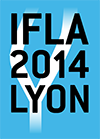
80th IFLA General Conference and Assembly
16-22 августа 2014, Lyon, France
Call for Papers
Health and Biosciences Libraries Section
Theme:
Health librarians and the changing information landscape
Date
15 August 2014
Venue
Université Claude Bernard Lyon, France
Organiser
IFLA Health and Biosciences Libraries Section
The capacity of new data analytical tools and services to interrogate massive datasets presents both opportunities and challenges for health services. It is a relatively new challenge for librarians but in facing it they can learn from their experience in adapting to enormous changes in information production, management and distribution over the past couple of decades. This experience has not only changed the profession itself but has helped to alter the way knowledge is created and used across the health sector. Librarians’ ability to harness the potential of online resources has been crucial to the development of evidence based medicine. Their retrieval and information organisation skills have been essential to the process of research synthesis and its delivery to clinicians, health service management and policy makers. Knowledge of research synthesis tools such as meta-analysis has helped to expand the role of the librarian beyond the traditional functions of organising and providing access to professional knowledge.
Increasing familiarisation with the standards and processes of health informatics has underlined the importance of data management skills. For many health librarians, knowledge of the structures and standards of health surveillance systems, patient records and epidemiological datasets are complementing skills in classification and taxonomy. This knowledge will be essential if we are to take on key roles in the mufti-disiplinary teams becoming ever more prevalent in public health, clinical settings and in academia.
Healthcare providers are producers of massive amounts of data but have been slower than business to exploit the potential of ‘big data’. At the public health level we have the capacity to use both structured and unstructured data to observe increasingly defined trends and make predictions. Better health outcomes for individual patients will result from the capacity to link data from primary and secondary care. These developments will depend on increasingly complex algorithms producing ever more sophisticated analysis. The role for librarians in this information revolution is not yet clear.
Submitting proposals
We invite you to submit a proposal relevant to the theme and which may cover one of the following topics:
- To what extent is health science librarianship integrating with the field of health informatics?
- As health librarians’ role in managing data increases, will there be a profound shift in their role profile?
- As the function of print material repositories diminishes what implications does this have for the library space?
- Will some information management tasks become redundant as health service decision making becomes more reliant on interrogation of massive datasets?
- How will the need for more knowledge on health informatics and new data analytical tools change health librarians’ training and education?
- Will our current concept of what evidence-based medicine is be changed radically as knowledge in health relies more on access to, and the ability to manipulate, currently unused sources of data?
Proposals should include:
- A structured abstract (Objectives/Project Scope; Methods; Results; Conclusions/Implications) of 350 - 400 words.
- Summary of the author(s) details (name, institution, position) and brief biographical statement of no more than 50 words.
- Submit proposals electronically no later than Friday 25 April, 2014 to [email protected].
- Selected presenters will be notified by Friday May 16, 2014.
Papers or presentations
Presenters will be expected to submit final versions of their papers or presentations by June 01, 2014. The language of the session will be English. Presenters will have up to 30 minutes at the programme to deliver their presentations, and time will be allowed for an open forum to allow audience interaction.
For more information, please contact:
Brian Galvin [email protected]
Submissions
All proposals must be in before 25 апреля 2014.
Please note
All expenses, including registration for the conference, travel, accommodation etc., are the responsibility of the authors/presenters. No financial support can be provided by IFLA, but a special invitation can be issued to authors.
Congress Attendance Grants
The French National Committee and IFLA have worked hard to secure funds for Conference Participation Grants. Up-to-date information is available on our Conference Participation Grants webpage.
Last update: 18 March 2014


